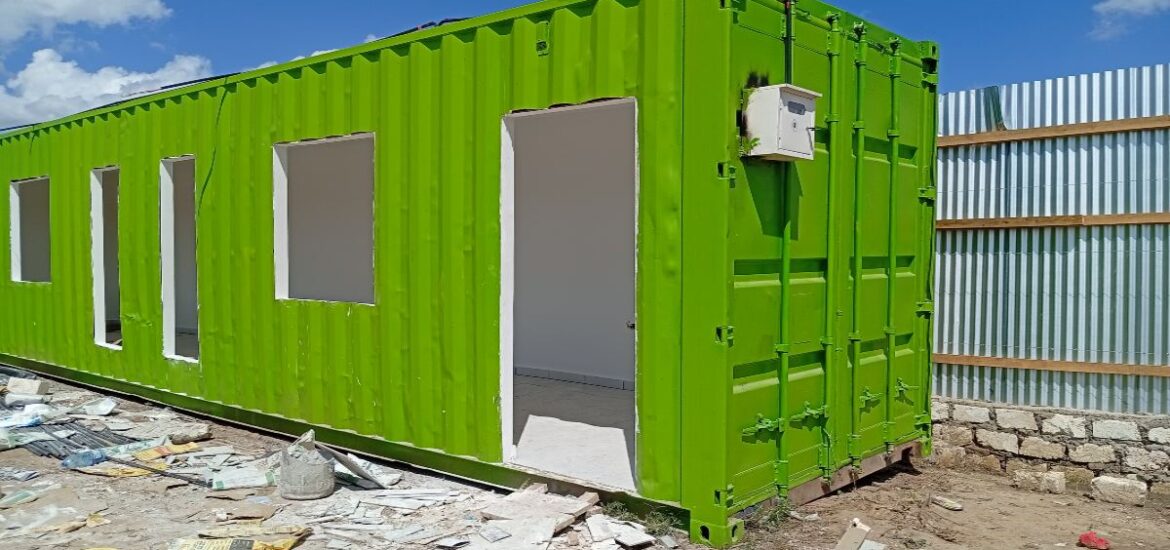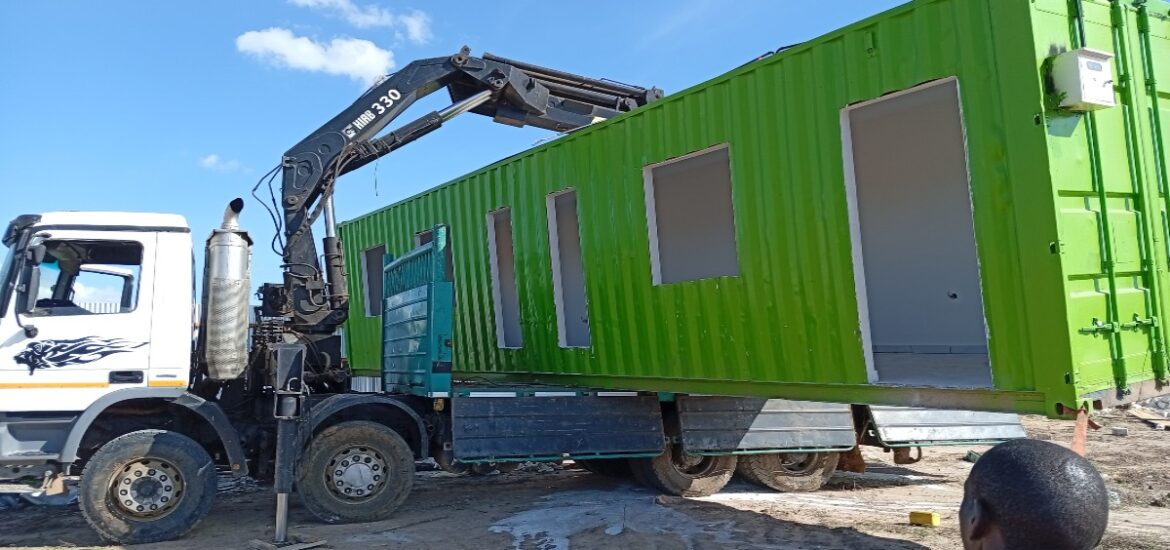Affordable Container Fabrication Services in Mombasa
In the heart of Kenya’s bustling port city, Mombasa, innovation is taking place—not in high-rises or tech labs, but in steel boxes. Shipping containers, once used solely to transport goods across oceans, are now being transformed into homes, shops, offices, cafés, and even classrooms. This transformation is made possible through container fabrication services, a booming industry in Mombasa that combines functionality, affordability, and sustainability.
In this comprehensive guide, we explore the rise of affordable container fabrication services in Mombasa, why they’re gaining popularity, and how you can benefit from them whether you’re a business owner, property developer, or simply someone looking to explore modern, eco-friendly building alternatives.
🌍 Why Container Fabrication is Gaining Popularity in Mombasa
Mombasa is a natural hub for container repurposing. With the Port of Mombasa being the largest seaport in East Africa, thousands of shipping containers arrive and depart each month. Many of these containers, after serving their purpose on the seas, end up idle or in scrap yards.
But now, innovative businesses and craftsmen are giving these containers a second life. Here’s why Mombasa is uniquely positioned for this trend:
- Abundant Supply: Due to port activity, containers are readily available.
- Cost-Effective: Fabricating a container into usable space is often cheaper than traditional construction.
- Speed: Fabrication takes weeks instead of months.
- Eco-Friendly: Repurposing steel containers reduces waste and lowers the carbon footprint of construction.
- Flexible Design: Containers can be customized for almost any use.
🏗️ What is Container Fabrication?
Container fabrication is the process of modifying shipping containers to serve a new purpose. This could be as simple as cutting a few windows and adding insulation to make a livable unit, or as complex as combining multiple containers to build multi-storey buildings or mobile businesses.
The process involves:
- Design Consultation – Discussing the intended use and layout.
- Structural Modifications – Cutting, welding, and reinforcing where necessary.
- Insulation & Waterproofing – Ensuring comfort and durability.
- Electrical & Plumbing Installation – For livable or functional spaces.
- Interior Finishing – Walls, flooring, ceilings, and furnishings.
- Exterior Aesthetics – Painting, branding, or cladding.
📸 [Image Placeholder: Before and After Container Conversion – Office Setup]
🔍 Key Types of Container Fabrication Services Offered in Mombasa
Container fabrication services in Mombasa have evolved to cater to a variety of client needs. Let’s break down the most popular options available:
1. Residential Units
Compact yet fully functional homes, ideal for urban areas or remote properties. These homes come with:
- Bedroom and living areas
- Kitchenettes and bathrooms
- Electrical and water systems
Many Mombasa residents and investors are turning to container homes as a budget-friendly housing solution, especially for rental properties or Airbnbs.
2. Commercial Shops and Kiosks
Street vendors, boutiques, and mini-marts have found a solid, secure, and movable alternative to wooden stalls. Fabricated container shops offer:
- Roll-up shutters
- Shelving and counters
- Branding and signage options
3. Office Spaces
Small businesses are increasingly looking for quick-to-install office units. Containers can be transformed into fully equipped, air-conditioned offices with:
- Workstations
- Internet and power points
- Meeting spaces
4. Cafés and Restaurants
The “container café” concept has taken off in Mombasa’s food scene. Fabricators create trendy, functional spaces that attract modern diners, complete with:
- Kitchen fittings
- Seating areas
- Stylish lighting and décor
5. Ablution Blocks
Public sanitation remains a challenge in some areas, and container ablution blocks provide a clean, durable solution. These include:
- Toilet cubicles
- Showers
- Water tanks and plumbing systems
6. Mobile Units
Containers mounted on trailers serve as:
- Food trucks
- Medical units
- Mobile offices for construction sites
📸 [Image Placeholder: Container Café in Urban Mombasa]
💰 How Affordable Are Container Fabrication Services in Mombasa?
One of the strongest selling points of container fabrication is affordability. Compared to traditional brick-and-mortar construction, container buildings in Mombasa cost up to 30–50% less. Here’s a rough pricing overview:
| Service Type | Starting Cost (KES) |
|---|---|
| Single Container Shop | |
| 1-Bedroom Container Home | |
| Office Unit | |
| Ablution Block | |
| Multi-Unit Designs |
Note: Prices vary depending on customization, insulation, finishes, and utility connections.
🛠️ Where to Find Reliable Fabricators in Mombasa
While demand is growing, so is the number of providers. But not all container fabricators deliver quality, safety, and durability. Here’s what to look for:
✅ Key Traits of a Reliable Container Fabricator:
- Experience: Proven track record with portfolios or site visits
- Compliance: Follows construction safety and quality standards
- Customization: Offers design flexibility
- After-Sale Support: Maintenance and warranty options
- Transparent Pricing: No hidden costs or vague estimates
🔧 Recommended Local Fabricators
Mombasa boasts several reputable container fabricators. Look out for businesses located in:
- Changamwe (near the port and industrial zone)
- Miritini (where large yards are set up)
- Shimanzi (closer to shipping depots)
- Likoni (serves South Coast and mobile clients)
📸 [Image Placeholder: Fabrication Workshop with Welders at Work]
💬 Real Testimonials from Container Clients in Mombasa
“Affordable and Fast”
“We needed a small office unit for our construction firm in less than a month. The container option was perfect—faster and cheaper than renting!”
— Kevin O., Contractor, Nyali
“Perfect for My Boutique”
“I run a fashion stall in Tudor, and my fabricated container shop gets compliments all the time. It’s secure, easy to clean, and stylish!”
— Aisha M., Retailer
“Great for Remote Projects”
“We used containers as housing for our team at a remote site in Kilifi. The workers had a clean, insulated space within weeks. No regrets.”
— Simon L., NGO Project Manager
🌱 Eco-Friendly and Sustainable Living
One of the lesser-known but increasingly important benefits of container fabrication is environmental sustainability. Rather than letting steel containers rust away in depots or become scrap metal, they’re upcycled into usable buildings.
- Recycled Materials: Reduces demand for bricks, cement, and timber.
- Lower Carbon Footprint: Less energy-intensive construction.
- Minimal Land Disruption: Containers can be set on simple foundations.
For environmentally conscious developers and homeowners, container homes offer the ideal balance of green living and cost efficiency.
🧠 Tips Before You Start Your Container Fabrication Project
If you’re considering a container-based project in Mombasa, here are some smart tips to keep in mind:
- Choose the Right Size – 20ft and 40ft containers are the most common. Select based on space needs.
- Mind the Heat – Mombasa gets hot! Insulation and ventilation are crucial.
- Check Local Bylaws – Ensure you have the proper permits if setting up in residential or commercial zones.
- Plan Utilities Early – Factor in plumbing, electricity, and water storage from the start.
- Think About Mobility – If you plan to move your unit, design it with transport in mind.
- Ask for a Site Visit – Good fabricators are always happy to show previous work.
📸 [Image Placeholder: Interior View of a Fully Furnished Container Home]
🚀 Final Thoughts: The Future of Affordable Construction in Mombasa
Container fabrication services in Mombasa aren’t just a trend—they’re a smart, scalable, and sustainable solution for the future. Whether you’re starting a business, expanding office space, or building a home on a tight budget, container structures offer unmatched versatility and value.
With the city’s growing population and infrastructure demands, container buildings provide a modern answer to Kenya’s housing and commercial space challenges. And with the right fabricator, you can get a personalized, durable, and beautiful space at a fraction of the cost and time.
So if you’ve ever dreamed of creating your own shop, café, office, or home, maybe it’s time to think inside the box.
📞 Ready to Get Started?
Looking for reliable and affordable container fabrication services in Mombasa? Get in touch with a local expert today. Ask for a quote, view sample projects, and begin your journey toward a smarter space.
📍 Visit workshops in Alshifa Building, Haile Selassie Avenue Mombasa
📧 Email: [email protected]
📱 Call/WhatsApp: +254 729 896 689


